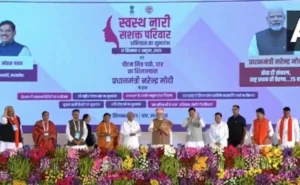Context

The foundation stone for India’s first PM MITRA Park was laid in Bhainsola village, Dhar district, Madhya Pradesh, marking a significant milestone in India’s textile sector reform.
This mega integrated textile hub aims to streamline the entire textile value chain from fibre production to final apparel exports, while generating employment and boosting exports.
What is PM MITRA Park
- Full Form: Pradhan Mantri Mega Integrated Textile Region and Apparel.
- Ministry: Ministry of Textiles, Government of India.
- Objective:
- Establish large-scale, integrated textile hubs with world-class infrastructure.
- Cover entire textile value chain:
- Farm → Fibre → Yarn → Fabric → Apparel → Export.
- Provide plug-and-play units, worker housing, effluent treatment, renewable power, and modern logistics.
Policy Alignment:
Supports the government’s 5F Vision – Farm → Fibre → Factory → Fashion → Foreign, while strengthening “Make in India” and “Vocal for Local”.
Strategic & Policy Significance
- Value Chain Integration
- Centralizes entire textile process in one location.
- Reduces logistics costs and lead times.
- Improves quality control and competitiveness in global markets.
- Support to Cotton Farmers
- Madhya Pradesh is a major cotton and organic cotton producer.
- Local processing ensures fair value to farmers and reduces wastage.
- Rural Employment Boost
- Creation of skilled and unskilled jobs, especially for women.
- Improves local infrastructure, including housing and healthcare.
- Green Textile Production
- Adoption of Zero Liquid Discharge (ZLD) technology and renewable power.
- Establishes sustainability benchmarks for India’s textile industry.
- Strengthening Export Capability
- Aims to boost textile exports and reduce trade deficit in textiles and apparel.
- Positions India as a global textile hub.
Challenges & Concerns
- Infrastructure Readiness:
- Timely completion of CETP, roads, power supply, and logistics crucial for investor confidence.
- Environmental Management:
- High operational and maintenance costs of effluent treatment plants.
- Land Acquisition & Social Impact:
- Ensuring fair compensation, rehabilitation, and welfare of displaced communities.
- Skilled Workforce:
- Need for skill development programs to train local youth for modern textile operations.
- Connectivity Issues:
- Efficient linkage to railways, highways, and ports essential for raw material and finished goods movement.
- Proximity to Indore and Pithampur offers advantages but requires further strengthening.
Wider Implications
- Model for Future Parks:
- Will act as a benchmark for six other proposed MITRA parks in Telangana, Gujarat, Karnataka, Uttar Pradesh, and Maharashtra.
- Industrial Development:
- Strengthens India’s manufacturing base, encouraging regional development and reducing urban migration.
- Global Textile Leadership:
- Helps India capitalize on global demand shifts and position itself as a sustainable textile exporter.




